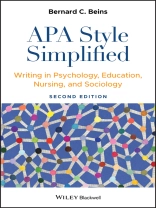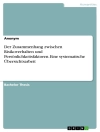Master the fundamentals of 7th Edition APA style with this newly updated one-step resource
The newly and thoroughly revised Second Edition of APA Style Simplified: Writing in Psychology, Education, Nursing, and Sociology delivers a concise but comprehensive guide to writing clearly and effectively in APA style. It incorporates fresh guidelines from the Seventh Edition of the APA publication manual.
Distinguished psychologist, academic, and author Dr. Bernard C. Beins walks readers through how to write objective scientific research papers using engaging prose. He explains how to develop ideas, connect them to what others have written, and express them clearly. The book also describes the differences between written, oral, and poster presentations and offers instructions for applying APA style to each one.
APA Style Simplified: Writing in Psychology, Education, Nursing, and Sociology 2nd Edition goes beyond mere structural conventions and teaches readers the importance of choosing effective wording, the right and wrong times to use technical language, and avoiding commonly encountered mistakes in word and sentence selection. The author also includes sections on:
* How to write an engaging and informative introduction, including an interesting hypothesis
* How to describe your chosen experimental method, including participants and subjects, materials and apparatus selection, procedure, and design
* How to effectively communicate statistics and statistical concepts by keeping your mind on the point you’re trying to make
* How to show your results and relate them back to your hypothesis, including a few points about how to present your results to others
Perfect for students pursuing psychology, education, nursing, or sociology programs at any level, from undergraduate to postgraduate, APA Style Simplified also belongs on the bookshelves of working professionals in the same fields who hope to sharpen their APA-style writing, communication, and presentation skills.
Innehållsförteckning
Writing in APA Style
Chapter 1–Writing Professionally
* How does Professional Writing Differ from Other Kinds of Writing?
* Using APA Style
* Making a Credible Argument
* Different Types of Communication
* Effective Communication
* Establishing Good Writing Habits
* Ethical Writing
Chapter 2–Elements of Style
* Recognizing the importance of good grammar and style
* Choosing Effective Wording
* Using Inclusive and Appropriate Language
* Deciding on the Use of Technical Language
* Avoiding Common Problems
Chapter 3–The Introduction Section
* Introducing the Topic
* Different Approaches to Starting the Introduction
* How to Begin
* Reviewing What Others Have Already Done
* Reasons for Reviewing the Literature
* Clarifying Terms in Research
* Introducing your Research: Generating a Hypothesis
Chapter 4–The Method Section
* Participants and Subjects
* Materials and Apparatus
* Procedure
* Design
Chapter 5–Communicating Statistics
* Why do we use statistics?
* What point are you trying to make?
* Understanding your numbers
* Helping Readers Understand Your Statistics
* Differentiating Results and Interpretations
Chapter 6–The Results
* Your Hypotheses
* Deciding What to Present
* Reporting Significant and Nonsignificant Results
* APA Style and Presentation of Your Results
* Creating Tables
* Creating Figures
* The Connection Between the Text and the Tables and Figures
* The Difference Between Results and Discussion Sections
* Some Final Points About Presenting Results
Chapter 7–The Discussion Section
* Summarizing your Results
* Connecting Different Aspects of your Results
* Dealing with Nonsignificant Results
* Comparing your Results with Those of Others
* Stating the Importance and Implications of your Results
* Acknowledging the Limitations of your Study
Chapter 8–References: Citations in the Text and the Reference List
* Citing References in the Text
* Order of Citations in the Reference List
* Using Your Word Processing Program to Create the Citation
Chapter 9–Final Touches: The Abstract and Formatting Details
* The Abstract
* Formatting Details
Chapter 10–Creating Poster Presentations
* Differentiating Visual and Written Communication
* Reducing the Amount of Information
* Visual Style
* Your Behavior: The Ethic of a Poster Session
* Creating Your Poster Using Power Point¯
Chapter 11–Giving Oral Presentations
* The Difference Between Oral and Written English
* Adapting APA Style to Oral Presentations
* Preparing for Your Presentation
* Creating Graphics for Your Presentation
* Giving the Presentation
Chapter 12–Presenting your Work on the Internet
* Capabilities with Internet Publication
* Using a Word Processor to Create Manuscripts for the Internet
* Advantages of Internet Publishing Software
* Publishing Your Poster on the Web
* Uploading your manuscript to the Internet
Appendix A–Sample Paper with Common Errors
Appendix B–Corrected Sample Paper
References
Om författaren
Bernard C. Beins, Ph D, is Professor of Psychology at Ithaca College, New York. He is the recipient of the Charles L. Brewer Distinguished Teaching of Psychology Award from the American Psychological Foundation. He has served as president of the Society for the Teaching of Psychology, the Eastern Psychological Association, and the New England Psychological Association. He is a Fellow of the American Psychological Association, Association for Psychological Science, Eastern Psychological Association, and New England Psychological Association.












